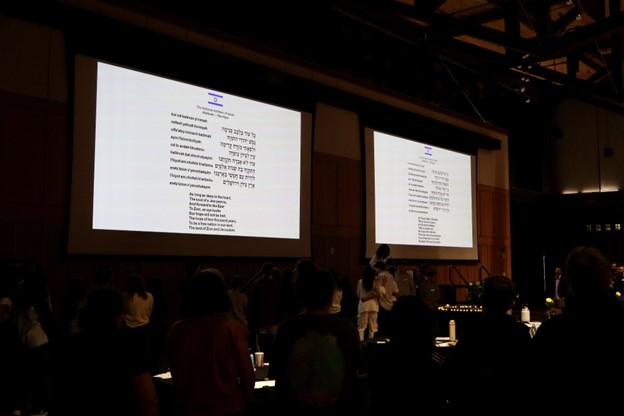University of Massachusetts Hillel hosted a memorial in the Student Union Ballroom, commemorating the first anniversary of the Oct. 7 attacks. Over 150 people including students, staff and community members attended the event, and prior registration was required.
According to the U.S department of State, on Oct. 7, 2023, 1200 people were killed by Hamas, making it “the largest massacre of Jews since the Holocaust.” Hamas had taken 254 people hostage with 97 people remaining hostage to this day.
The memorial was inspired and shaped by the Jewish traditions “kavod ha-met” (honoring for the dead) and “nihum avelim” (comforting the mourners).
“For anyone here tonight who lost a loved one on [Oct. 7], on behalf of all of us, I want to offer you our comfort and care. And while the grief of direct mourners is distinct, we also want to acknowledge tonight that each of us is carrying grief,” Rabbi Aaron Fine said.
The room was situated with a stage up front and tables scattered through the open room. In the center of the tables were papers of prayers and names of the hostages as well as yellow flowers, candles, stones and paint makers.
In Nov. 2023, UMass Hillel hosted Shye Klein Weinstein, a survivor from the Oct. 7 Nova music festival, to speak about his experience. Sharing his story, Weinstein said, was his way of helping those who cannot speak about their experiences.
Several participants vocalized their experiences and grief, showing pictures and recounting memories of those they had lost in the attacks. The majority of people remained silent and listened as they empathized with the speakers.
Videos from YouTube of people’s experiences from the attacks were projected to the room. One video shown from the Oct. 7 attack was of a girl who lost her boyfriend right in front of her as he jumped on a grenade to save her life.
At 8 p.m., the names of hostages were read, and a prayer was said in their honor, first in Hebrew then in English.
Attendees were asked to take a stone and paint what they were feeling, thinking or being reminded of. People were also encouraged to paint anything, symbols or words, that gave the participants hope or helped sustain and nurture them. During this time, people spoke in open conversations with hushed tones about how they were affected by the event.
“In Judaism, it’s traditional after a funeral or when you visit a grave to put a stone on the grave as another expression of remembrance and respect. Stones can symbolize brokenness since they are broken pieces of bigger rock, but they can also symbolize healing since over time, water soothes the harsh edges. Tonight, if you’d like, I invite you to hold one of the stones, choose a stone, and make it yours,” Rabbi Fine said.
As people began to finish their designs, people brought the stones and the candles on their tables to the front table. After placing their stones on the tables, people stepped back and formed semi circles, embracing each other with hugs and swaying with arms around each other’s backs.
At the end of the event, Israel’s national anthem was sung by attendees.
Mia Blue can be reached at [email protected] or on X (twitter) @Mia_Blue17.
Kalina Kornacki can be reached at [email protected] or on X (twitter) @KalinaKornacki.
This article has been updated to reflect updated attendance figures provided by Hillel and corroborated with the journalist present





















